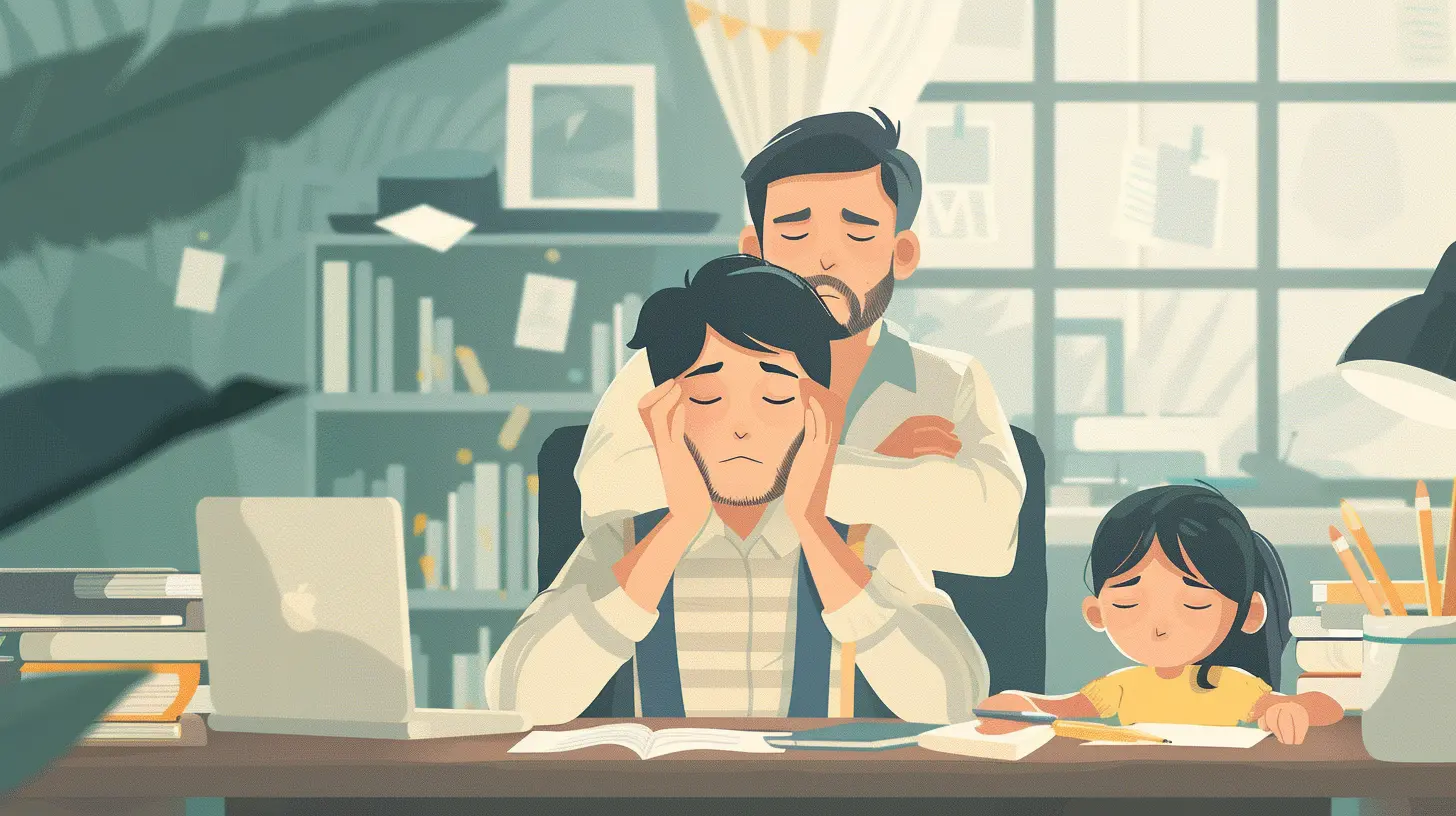Understanding Parental Burnout and How to Overcome It
3 October 2025
Being a parent is one of the most fulfilling roles in life, but let’s be real—it’s also one of the toughest. Between the endless diaper changes, school runs, late-night fevers, teenage drama, and trying to juggle a million other responsibilities, it’s easy to feel like you’re running on fumes. If you’ve ever found yourself lying awake at night, totally drained and wondering how you’re supposed to do it all again tomorrow, you’re not alone.
Let’s talk about something that doesn’t get enough spotlight—parental burnout. Yes, it’s a real thing. And no, you're not just "bad at this parenting thing" if you're feeling exhausted. You're human. In this article, we’re diving deep into what parental burnout actually is, how to recognize the signs, and most importantly, how to pull yourself out of the emotional quicksand.
What Exactly Is Parental Burnout?
Parental burnout is what happens when the daily stresses of parenting pile up over time without enough support, rest, or emotional refueling. Think of it like this: You're a smartphone. You can only go so long without being recharged before your screen dims, your apps close, and eventually—you shut down.It’s not just about being tired; it’s a specific kind of chronic exhaustion that’s directly connected to your role as a parent. When you're burned out, you're not just physically drained, you're emotionally spent and mentally foggy. You start feeling like you're no longer the parent you want to be—even the parent you used to be.
The Common Culprits: Why Burnout Hits Hard
Let’s break down some of the top things that can trigger parental burnout:1. Endless Responsibilities
Let’s face it—being a parent is a full-time job. Actually, scratch that. It's like four full-time jobs. You're a chef, chauffeur, nurse, therapist, and personal assistant—all rolled into one. No wonder you're worn out!2. Lack of “Me Time”
When was the last time you did something just for yourself? If it takes more than a few seconds to answer that, there's your red flag. Many parents put everyone else first and put themselves dead last. Over time, that catches up with you.3. Unrealistic Expectations
Social media doesn't help. You scroll through perfectly filtered family photos, clean homes, and home-cooked meals and wonder, “Am I doing enough?” Spoiler alert: You are. But comparing yourself to an Instagram highlight reel adds unnecessary pressure.4. Parenting in Isolation
Parenting was never meant to be a solo adventure. But many parents today don’t have a village to lean on. When you’re doing it all yourself—with little help—it’s bound to feel overwhelming.5. Chronic Sleep Deprivation
This one needs no explanation. If you're not sleeping, you're not functioning. Long-term sleep deprivation messes with your mood, memory, and patience—all prerequisites for parenting.
Spotting the Signs: Are You Burned Out?
You might be thinking, “How do I know if I'm just tired or actually burned out?” Great question. Here are some telltale signs to watch for:Emotional Exhaustion
You wake up tired. You go to bed tired. You feel like you have nothing left to give. If your emotional tank is always on empty, pay attention.Detachment from Your Kids
You love your kids—but lately, you feel disconnected. You might lash out more easily, or feel numb when you know you "should" feel joyful or proud.Feeling Like You’re Failing as a Parent
You constantly second-guess every decision, beat yourself up over mistakes, and feel like you’re not enough.Physical Symptoms
Headaches, body aches, changes in appetite, poor sleep—these are your body's SOS signals.Resentment
This one’s tough to admit, but it happens. You might catch yourself resenting your kids, your partner, or your situation. And then comes the guilt—which just adds fuel to the burnout fire.
The Effects of Unchecked Burnout
Ignoring parental burnout isn't just bad for you—it affects your entire family. When you’re running on empty, it’s harder to be patient, present, and emotionally available. Over time, burnout can lead to depression, anxiety, and even relationship breakdowns.Your kids notice, too. Children are incredibly intuitive. They can sense when something’s off—even if they don’t fully understand what's going on. And they may respond with behavioral issues, acting out, or becoming withdrawn.
So, How Do You Beat Parental Burnout?
Okay, now that we’ve identified the beast, let’s talk battle plans.1. Prioritize Self-Care (Seriously)
Let’s start here, because it’s the one most parents skip. Self-care isn't a luxury—it’s a necessity. You can’t pour from an empty cup. Whether it’s 15 quiet minutes in the morning, yoga before bed, or a solo walk around the block—find your “recharge” activity and make it non-negotiable.2. Ask for Help (And Accept It)
This isn't the time to be a superhero. Reach out to your spouse, friends, family, or even a babysitter. Ask your partner to take over bedtime. Order takeout instead of cooking. Saying “I need help” is a strength, not a weakness.3. Lower the Bar
You don’t need to be a Pinterest-perfect parent. Good enough is good enough. Frozen chicken nuggets and screen time won't ruin your children. Perfection is the enemy of peace.4. Connect with Other Parents
You’d be amazed how healing it is to talk with someone who gets it. Join a local parenting group or hop into an online forum. Share your struggles, your wins, your “what do I do now?” moments. There's comfort in knowing you’re not alone.5. Practice Mindfulness
Mindfulness doesn’t mean you have to meditate for an hour in silence (who has the time?). It can be as simple as taking a few deep breaths when you're overwhelmed or being fully present during bedtime stories. These tiny pauses help calm your nervous system and reset your mood.6. Re-evaluate Your Schedule
Are you overscheduled? Between soccer practice, dance class, PTA meetings, and work, there’s barely a minute left for breathing. It’s okay to say no. Protect your family's time and sanity.7. Talk to a Professional
If you’re feeling persistently down, anxious, or hopeless, please don’t tough it out alone. Therapists, counselors, and support groups are there to help you sort through the fog.Creating a Burnout-Proof Routine
While burnout can sneak up on you, creating routines can offer stability and predictability—which can be a game-changer. Here's a basic framework:- Morning ritual: Even just five minutes of quiet with coffee before the kids wake up can set the tone for the day.
- Scheduled “me time”: Put it on the calendar like any other appointment.
- Family check-ins: Once a week, ask everyone how they’re doing. Keep communication open and honest.
- Nighttime wind-down: Turn off screens, dim the lights, and give your brain a chance to unplug.
Don't Wait Until You're Running on Empty
Here’s the thing—burnout doesn’t happen overnight. It’s a slow build, like a leaky faucet that eventually floods the kitchen. Pay attention to your internal “check engine” light. The earlier you recognize the signs, the easier it is to steer away from total burnout.And remember: taking care of yourself isn't a detour from being a good parent—it’s part of the journey.
Let’s Be Real: It’s Okay to Struggle
Parenting isn’t all sunshine and finger paints. It’s messy. It’s challenging. And sometimes, it’s downright exhausting. If you’re feeling burned out, you’re not broken—you’re normal.Give yourself the same grace you give your kids. When they’re having a meltdown, you don’t judge them—you hold them. It’s time to hold yourself, too.
Because here’s the truth: You are enough. You are doing a great job. And you deserve support, love, and rest just as much as anyone else.
Final Thought
Parental burnout is more common than people think—so if you're feeling it, know you're far from alone. Recognizing the signs is step one. Taking action is step two. And step three? That’s you, feeling whole again, laughing with your kids, and maybe even—dare we say—enjoying the chaos a bit more.You've got this. And if you ever feel like you don't—you've got a whole community of parents who understand exactly how you feel.
all images in this post were generated using AI tools
Category:
Parenting StressAuthor:

Steven McLain
Discussion
rate this article
1 comments
Weston Walker
This article offers valuable insights on recognizing and addressing parental burnout. Practical tips can truly help parents regain their energy and joy.
October 7, 2025 at 2:53 AM

Steven McLain
Thank you for your kind words! I'm glad you found the insights and tips helpful in addressing parental burnout.


